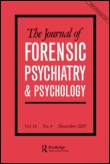
JOURNAL OF FORENSIC PSYCHIATRY & PSYCHOLOGY
Scope & Guideline
Exploring the Nexus of Psychology and Law
Introduction
Aims and Scopes
- Forensic Assessment and Evaluation:
The journal emphasizes rigorous methodologies for assessing mental health in forensic settings, exploring tools and frameworks such as the HCR-20 and other structured assessments to evaluate competency, risk, and treatment outcomes. - Criminal Behavior and Mental Health:
Research focuses on the psychological underpinnings of criminal behavior, including studies on personality disorders, psychopathy, and the impact of childhood trauma on later offending. - Intervention and Treatment Strategies:
The journal highlights innovative treatment methodologies and interventions designed for forensic populations, including cognitive-behavioral therapy, psychosocial interventions, and community treatment programs. - Policy and Ethical Considerations:
Discussion of the ethical and legal implications of mental health practice within the criminal justice system, including the rights of patients and the responsibilities of mental health practitioners. - Emerging Issues in Forensic Psychology:
The journal addresses contemporary challenges such as the effects of technology in forensic settings, the impact of COVID-19 on mental health services, and the evolving landscape of forensic psychiatry.
Trending and Emerging
- Neurodevelopmental Disorders and Criminality:
Research increasingly addresses the role of neurodevelopmental disorders, such as ADHD and Autism Spectrum Disorder, in criminal behavior, highlighting the need for tailored interventions. - Impact of Trauma on Offending Behavior:
There is a rising trend in exploring how adverse childhood experiences and trauma influence criminal behavior, emphasizing the importance of trauma-informed care in forensic settings. - Technological Integration in Forensic Practice:
The use of technology in assessments, treatment, and monitoring of forensic patients is gaining traction, reflecting the broader societal shift towards digital solutions in healthcare. - Mental Health Interventions in Prisons:
There is a growing emphasis on the effectiveness and implementation of mental health interventions within prison populations, including studies focused on anger management, cognitive-behavioral therapy, and rehabilitation. - Cultural Competence in Forensic Settings:
An emerging focus on cultural competence in forensic evaluations and treatment approaches is evident, recognizing the diverse backgrounds of individuals within the criminal justice system.
Declining or Waning
- Traditional Legal Frameworks:
Research focusing strictly on conventional legal definitions and frameworks, such as the M'Naghten Rule, appears to be diminishing, possibly in favor of more dynamic and interdisciplinary approaches to understanding mental health issues in the legal context. - Generalized Risk Assessment Tools:
While risk assessment remains crucial, there has been a noticeable decline in studies focusing solely on traditional, generalized risk assessment tools without considering their contextual application or the nuances of individual cases. - Stigmatization of Mental Illness:
Although the stigma surrounding mental illness continues to be relevant, fewer studies are addressing this issue directly as a primary focus, suggesting a shift towards more actionable interventions and policy discussions. - Historical Case Studies:
There has been a waning interest in purely historical case studies or anecdotal analyses of forensic cases, with a preference for empirical research that supports evidence-based practice.
Similar Journals
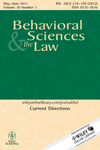
BEHAVIORAL SCIENCES & THE LAW
Transforming Legal Understanding Through Behavioral ResearchBehavioral Sciences & The Law is a premier interdisciplinary journal published by Wiley, dedicated to exploring the intricate relationships between behavioral sciences and legal systems. Established in 1983 and continuing through 2024, this journal provides a vital platform for researchers, professionals, and students in the fields of law, clinical psychology, medicine, and psychiatry. With an impressive impact factor reflected in its Q1 ranking in Law and Q3 in Clinical Psychology, Psychiatry, and Medicine, it stands out in the academic community, facilitating scholarly discourse and advancing understanding in these critical areas. While currently not following an open access model, the journal’s reach is extensive, delivering cutting-edge research and thought leadership from the United Kingdom to a global audience. Whether you are investigating the psychological dimensions of legal practice or the implications of law on behavioral health, Behavioral Sciences & The Law remains an essential resource for those committed to the intersection of these disciplines.
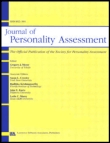
JOURNAL OF PERSONALITY ASSESSMENT
Elevating Standards in Personality AssessmentJOURNAL OF PERSONALITY ASSESSMENT is a leading scholarly publication dedicated to advancing the field of personality evaluation and psychological assessment. Published by Routledge Journals, Taylor & Francis Ltd, this prestigious journal has been serving the academic community since 1971, consistently pushing the boundaries of research through rigorous peer-reviewed articles. With an impressive Q1 categorization across multiple disciplines, including Clinical Psychology, Psychiatry and Mental Health, and Health, Toxicology and Mutagenesis, it ranks among the top journals in its field, reflecting a Scopus Rank of #41/311 in Clinical Psychology and #106/567 in Psychiatry. The year 2024 marks a continued commitment to excellence in psychological assessment, making this journal an essential resource for researchers, practitioners, and students who strive to understand and improve personality assessment methodologies. Although not an open-access journal, the insightful articles and findings published within serve as vital tools for navigating the complexities of human behavior and mental health.

Psychology and Law
Connecting scholarly minds to reshape law with psychological insight.Psychology and Law, published by Moscow State Psychological & Pedagogical University, is an open-access journal dedicated to advancing knowledge at the intersection of psychology and legal studies. Since its establishment in 2011, the journal has provided a platform for high-quality research that addresses critical issues in applied, clinical, experimental, cognitive, and social psychology. Despite ranking in the Q4 quartile for various psychology categories in 2023, this journal remains committed to fostering insightful discussions and contributions to the field. Researchers and practitioners from diverse backgrounds are encouraged to explore its accessible content, which aims to enhance our understanding of psychological principles within legal contexts. The journal's ISSN is 2222-5196, and it primarily serves an international audience, promoting scholarly engagement and interdisciplinary collaboration. As the field evolves, Psychology and Law continues to be a vital resource for those seeking to bridge the gap between psychological research and legal practice.
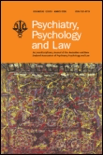
Psychiatry Psychology and Law
Championing High-Impact Research in Psychiatry and LawPsychiatry Psychology and Law is a prestigious journal dedicated to advancing the understanding of the interconnections among mental health, psychological conditions, and legal contexts. Published by Routledge Journals, Taylor & Francis Ltd, this journal plays a pivotal role in the field, evidenced by its impressive Q1 ranking in Law and notable positions in multiple disciplines such as Psychiatry and Forensic Medicine. With a commitment to disseminating high-quality research, it has established itself as an essential resource for researchers, professionals, and students in psychology and legal studies. While currently not offering Open Access options, the journal thrives on rigorous peer review processes that ensure only the most impactful studies from its inception in 1994 to the present are published. Covering a diverse range of topics, Psychiatry Psychology and Law fosters interdisciplinary dialogue and innovation, making it a vital platform for advancing scholarly discourse in the critical intersection of mental health and law.

International Journal of Forensic Mental Health
Empowering Clinicians with Forensic Mental Health KnowledgeThe International Journal of Forensic Mental Health is a prominent platform for scholarly discourse in the intersecting realms of forensic science, psychiatry, and mental health. Published by Routledge Journals, Taylor & Francis Ltd in the United Kingdom, this journal boasts an ISSN of 1499-9013 and an E-ISSN of 1932-9903. It serves as a critical resource for researchers, clinicians, and students aiming to explore the complexities of mental health within forensic contexts. With a publication span from 2002 to 2024, the journal has secured its place in Q3 quartiles for both Pathology and Forensic Medicine, as well as Psychiatry and Mental Health, showcasing its contribution to advancing knowledge in these vital areas. The journal is indexed in Scopus, with respectable rankings that reflect its importance and reach: 18th out of 45 in Psychiatric Mental Health and 103rd out of 208 in Pathology and Forensic Medicine. While not currently offering Open Access, it continues to provide valuable insights and research findings that significantly impact clinical practices and forensic policies worldwide.
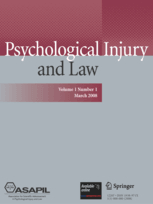
Psychological Injury & Law
Bridging Psychology and Law for a Healthier TomorrowPsychological Injury & Law, published by SPRINGER, stands at the forefront of interdisciplinary research, merging insights from the fields of law, psychology, and mental health. With an ISSN of 1938-971X and an E-ISSN of 1938-9728, this esteemed journal aims to address the complexities of psychological injuries within legal contexts, providing a platform for scholars to explore the intersection of legal principles and psychological well-being. Recognized for its rigor, it has achieved a Q1 ranking in both Ecology and Law, and a Q2 ranking in Psychiatry and Mental Health for 2023, demonstrating its influence and contribution to these fields. Additionally, with impressive Scopus ranks placing it in the 95th percentile within Social Sciences (Law) and the 70th percentile in Medicine (Psychiatry and Mental Health), the journal consistently showcases high-quality, impactful research that resonates with professionals, academics, and students alike. By fostering a deeper understanding of psychological injuries, it serves as an essential resource for those seeking to navigate the intricate relationships between mental wellness and legal frameworks.
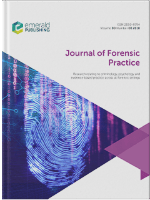
Journal of Forensic Practice
Bridging Law and Science for a Safer TomorrowThe Journal of Forensic Practice, published by Emerald Group Publishing Ltd, is a leading scholarly resource dedicated to the interdisciplinary domain of forensic science, law, and psychology. With an ISSN of 2050-8794 and an E-ISSN of 2050-8808, this journal serves as an essential platform for disseminating cutting-edge research and innovative practices in the field, spanning from 2013 to 2024. Despite its current impact factor positioning, ranking in quartiles such as Q4 in Applied Psychology and Q2 in Law illustrates its relevance to diverse academic communities, particularly within the United Kingdom and beyond. Researchers, practitioners, and students benefit from the journal's commitment to enhancing the understanding of the intersection between legal frameworks and psychological principles, thereby fostering a more robust forensic practice. The journal is not currently an open-access publication, ensuring a focused and specialized audience while gradually building its reputation across various Scopus categories. As the field of forensic practice evolves, this journal remains a vital source of knowledge, offering insight and guidance to the contemporary challenges faced by professionals in law and forensic sciences.

Journal of Intellectual Disabilities and Offending Behaviour
Innovating Research on Intellectual DisabilitiesJournal of Intellectual Disabilities and Offending Behaviour, published by EMERALD GROUP PUBLISHING LTD, serves as a pivotal platform for the exploration of interdisciplinary perspectives surrounding the complex interplay between intellectual disabilities and offending behavior. With an ISSN of 2050-8824 and an E-ISSN of 2050-8832, this journal aims to foster insightful discourse and advance knowledge in critical areas including clinical psychology, psychiatric and mental health studies, and forensic medicine. Ranked in the lower quartiles for 2023 across major categories—most notably Q3 in Pathology and Forensic Medicine—this journal seeks to address urgent research gaps and encourage innovative practices that support affected individuals. Although currently operating under a traditional access model, the importance of its contributions to academia cannot be overstated, particularly as it relates to enhancing our understanding of behaviors stemming from intellectual disabilities. Researchers, professionals, and students alike will find valuable resources and a collaborative environment in which to investigate these vital issues, thereby shaping future investigations and interventions.

Forensische Psychiatrie Psychologie Kriminologie
Exploring the Nexus of Law, Psychology, and Psychiatry.Forensische Psychiatrie Psychologie Kriminologie is a leading academic journal published by SPRINGER HEIDELBERG, specializing in the intersection of forensic psychiatry, psychology, and criminology. With an ISSN of 1862-7072 and E-ISSN 1862-7080, this journal has built a reputable place in the academic community, featuring essential research that informs the critical dialogue on legal and psychological practices as they pertain to mental health and criminal behavior. Indexed in Scopus, it holds a diverse range of impact factors across multiple disciplines, including a Q2 ranking in Law and notable placements within Applied Psychology and Psychiatry and Mental Health. The journal's commitment to advancing evidence-based practices and understanding of forensic mental health is evident from its broad editorial scope, making it a vital resource for researchers, clinicians, and students alike. The journal spans a timeline from 2007 to 2024, ensuring that it provides up-to-date insights into evolving methodologies and findings within this critical field.

MEDICINE SCIENCE AND THE LAW
Illuminating Ethical Challenges in Medical PracticeMEDICINE SCIENCE AND THE LAW is a prestigious journal published by SAGE PUBLICATIONS INC, focused on the intersection of law, health policy, and ethical issues as they pertain to medicine. With a long-standing history dating back to 1960, this journal has become a crucial platform for scholars and professionals alike to share and disseminate research that shapes the evolving legal landscape surrounding health care practices. It holds notable positions in the academic community, ranking in the Q3 category for Health Policy and Issues, Ethics and Legal Aspects, and achieving a distinguished Q1 ranking in Law as of 2023. With rigorous peer-review standards and a commitment to publishing high-quality research, MEDICINE SCIENCE AND THE LAW is invaluable for those exploring the critical legal challenges and ethical dilemmas faced within the healthcare sector. Research contributions are vital for informing policy and practice, ensuring that the journal remains a relevant and essential resource for researchers, practitioners, and students dedicated to the intersection of law and medicine.